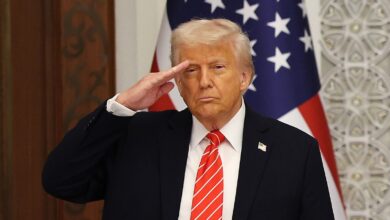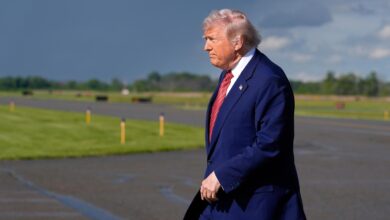Companies turn to AI to navigate Trump tariff turbulence

Artificial intelligence robot looking at futuristic digital data display.
Yuichiro Chino | Moment | Getty Images
Businesses are increasingly turning to artificial intelligence tools to help them navigate the complexities of global trade. Several tech firms have revealed that they are utilizing AI technology to visualize global supply chains, understand the impact of U.S. President Donald Trump’s reciprocal tariffs, and make informed decisions.
For instance, Salesforce recently announced the development of an import specialist AI agent that can quickly process changes in the U.S. customs system for thousands of product categories. This AI agent leverages the Harmonized Tariff Schedule to provide real-time insights and actions in response to tariff changes.
According to Eric Loeb, executive vice president of government affairs at Salesforce, the rapid pace and complexity of global tariff changes make it challenging for businesses to keep up manually. AI systems are enabling companies to make faster decisions regarding adjustments to their global supply chains.
Andrew Bell, chief product officer of supply chain management software firm Kinaxis, highlighted the use of machine learning technology to assess products, materials, and external signals like news articles and macroeconomic data. This technology allows companies to simulate different scenarios and evaluate the impact of tariffs on their supply chains.
With Trump’s tariffs impacting companies worldwide, AI technologies are emerging as crucial tools for adapting to changing trade landscapes. Companies like Walmart and Nike have already adjusted prices in response to tariffs, underscoring the need for AI-powered solutions to navigate these challenges.
‘AI’s moment to shine’
Experts believe that AI’s capabilities are particularly valuable in times of uncertainty caused by tariff measures. Zack Kass, a futurist, emphasized the importance of AI in providing proactive, data-driven solutions to complex trade challenges.
Nagendra Bandaru, managing partner at Wipro, highlighted how their agentic AI solutions are helping clients pivot supplier strategies and manage duty exposure dynamically in response to evolving policy landscapes. By leveraging a range of AI systems, Wipro aims to transform global trade into a proactive and data-driven advantage.
While AI offers significant benefits in navigating tariffs and trade uncertainties, it is not a one-size-fits-all solution. Companies must ensure that AI solutions have access to high-quality data to deliver accurate insights. Additionally, AI can assist in understanding logistics impacts, adjusting suppliers, and optimizing supply chain decisions in response to tariffs.
As global firms continue to invest in AI technologies, the role of AI in trade strategy and decision-making is expected to grow. AI’s ability to provide visibility, intelligence, and strategic guidance in a volatile trade environment is becoming increasingly essential for businesses worldwide.
text using different words:
Please rewrite the text in your own words.





